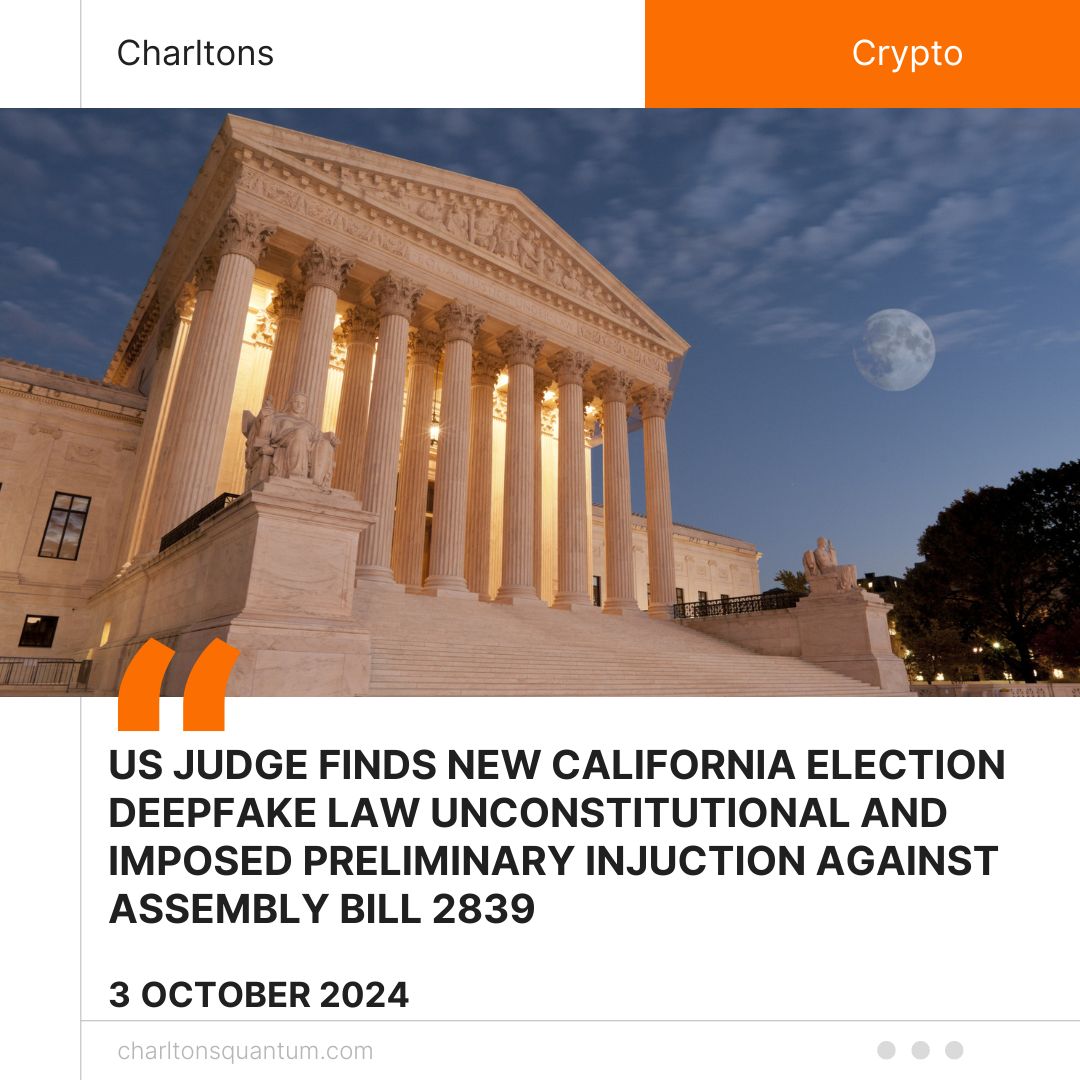
On 2 October 2024, U.S. District Judge John A. Mendez by its order issued a preliminary injunction against California’s newly enacted law, Assembly Bill 2839 (AB 2839), which sought to regulate the use of AI-generated deepfakes in elections. The law, signed by Governor Gavin Newsom on 17 September 2024, allowed individuals to sue for damages if AI-generated content resembling a political candidate was posted within 120 days before and 60 days after an election. This law targeted media that was deemed “materially deceptive” and harmful to the integrity of electoral processes.
The case that led to this ruling began in July 2024, when Christopher Kohls, a content creator known for his political satire under the alias “Mr. Reagan,” released an AI-manipulated video mocking Vice President Kamala Harris. The video, widely circulated and shared by notable figures, including Elon Musk, generated widespread attention across social media platforms. Following this, concerns arose about the potential of AI-manipulated media or deepfakes to mislead voters and undermine political candidates.
In response to these concerns, California’s legislature swiftly passed AB 2839, which sought to curb the use of such deepfakes during election periods. The law allowed for lawsuits against creators and distributors of content that could mislead voters or harm candidates through AI-altered political media. Shortly after the bill was signed into law, Kohls filed a lawsuit, challenging the constitutionality of the bill. Represented by his legal team, Kohls claimed that the law infringed on his First Amendment rights, particularly concerning his right to political satire and parody.
Kohls’ lawsuit, filed on 18 September 2024, named California Attorney General Rob Bonta and Secretary of State Shirley N. Weber as defendants, seeking to block the enforcement of the new law. He argued that the legislation imposed overly broad restrictions on free speech, and its vague definitions could lead to unnecessary censorship.
Kohls’ legal team contended that AB 2839 violated the First Amendment, which protects free speech, including political satire and parody. They argued that the video in question was a form of satirical expression, a category of speech that has historically been protected under the U.S. Constitution. Kohls’ team emphasised that the law was overbroad, as it did not clearly distinguish between deliberately deceptive content and legitimate forms of political expression such as critique, parody, and satire.
Kohls’ defense argued the chilling effect the law could have on political discourse, arguing that content creators like Kohls would be discouraged from producing satirical content for fear of potential lawsuits. The team asserted that public debate and criticism of political figures is essential in a democracy, and the law undermined this principle by threatening legal action against content creators even when the content is clearly satirical or humorous.
The State of California, represented by Attorney General Rob Bonta, defended AB 2839 as a necessary tool to protect the integrity of elections in the face of evolving technological threats, such as AI-generated deepfakes. They argued that AI-altered media poses significant risks to the democratic process, especially when it misrepresents political candidates or creates materially deceptive content that could mislead voters.
The State maintained that the law was designed to target knowingly false and malicious content, which could cause real harm during election cycles. They emphasised that the timing provisions, targeting media distributed within 120 days before and 60 days after an election, were crucial to protect voters from disinformation that could skew electoral outcomes.
State further contended that the law was aimed at minimising voter confusion and maintaining trust in the democratic process, arguing that AB 2839 was a reasonable restriction on speech to serve a compelling governmental interest, specifically the protection of election integrity.
In his ruling, Judge Mendez agreed with Kohls’ argument that AB 2839 likely violated the First Amendment. While acknowledging the serious risks posed by AI-generated deepfakes, the judge concluded that the law was overly broad and did not sufficiently distinguish between deceptive content and protected speech such as satire and parody.
Judge Mendez pointed out that the U.S. legal system has a long-standing tradition of protecting political expression, including satirical and parodic content. He emphasised that while the State’s concerns about election disinformation were legitimate, the First Amendment places strict limits on the government’s ability to regulate speech, particularly when it concerns public debate and criticism of political figures.
The judge described the law as a “blunt tool” that served as a broad restriction rather than a narrowly tailored regulation aimed at combatting specific instances of election disinformation. He highlighted the importance of using less restrictive alternatives—such as public fact-checking, counter-speech, or targeted penalties for truly harmful disinformation—to address the issue of AI-manipulated media.
Judge Mendez ruled that the law was unconstitutional under both the First Amendment and California’s free speech protections, stating that AB 2839 did not meet the required standards for content-based restrictions on speech. He granted a preliminary injunction, preventing the law from taking effect while the case proceeds.
(Source: https://charltonsquantum.com/wp-content/uploads/2024/10/preliminary-injunction-AB2839.pdf)





